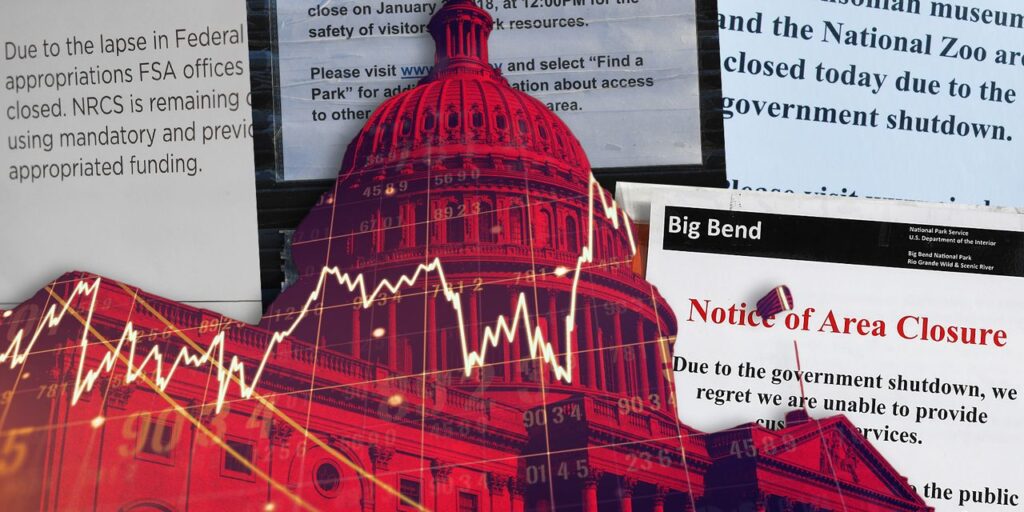A divided Congress is again struggling to avoid a partial government shutdown, and closures will hit in a week if U.S. lawmakers can’t reach agreement.
The Republican-run House of Representatives, led since Oct. 25 by new Speaker Mike Johnson, is expected to vote Tuesday on a short-term funding measure, known as a continuing resolution or CR, that would prevent a shutdown.
The specifics for that measure have been getting negotiated by Republicans, with some hardliners pushing for conditions related to border security or debt reduction, while GOP members in swing districts don’t want lots of conditions but rather a relatively “clean” CR.
Johnson and his deputies are expected to reveal the text for the measure by Saturday, because House rules call for providing lawmakers with 72 hours to read measures before a vote.
The House “will return for a potential vote on Tuesday to fund the government, but what that bill looks like is a total mystery. The Senate is likely to move a bipartisan CR, though that too is a bit of a mystery but it will keep funding levels constant,” said Chris Krueger, an analyst and managing director at TD Cowen Washington Research Group, in a note.
Johnson has floated the idea of a “laddered CR,” an approach that would set up multiple deadlines. Democrats have criticized that idea, with House Minority Leader Hakeem Jeffries saying Thursday that most of the chamber’s Republicans “have no idea what a laddered CR means, what it represents or how it would possibly be implemented.”
The new speaker’s difficulties in corralling his fellow House Republicans were illustrated this week as plans to vote on two appropriations bills were shelved due to disagreements. Congress is supposed to enact a dozen such bills each year to fund federal agencies and programs. Hardline Republicans have made passing all 12 bills separately — rather than a CR — a “cause célèbre” this year, TD Cowen’s Krueger noted.
Analysts said a shutdown looked unlikely two and a half weeks ago when Johnson became speaker, but now the Louisiana Republican is facing talk that his honeymoon period is over, and that he’s up against the same problems as his predecessor, former Speaker Kevin McCarthy, who had headaches because of his narrow House majority.
“The honeymoon might be shorter than we thought. Every time the CR expires, the speaker’s putting his head in the lion’s mouth,” GOP Rep. Thomas Massie of Kentucky told reporters Thursday. “If I were advising the speaker, I would say, ‘Do a one-year CR before the honeymoon period runs out.’”
The federal government is funded through Nov. 17 — which is next Friday — because McCarthy worked with House Democrats to pass a 45-day funding bridge on Sept. 30 that averted a shutdown. But McCarthy’s maneuvers angered some hardline Republicans, who then led the drive to oust him.
How markets handle shutdowns
The White House has urged Congress to act and indicated that President Joe Biden’s plans for next week haven’t been altered so far due to shutdown concerns. He’s due to take part in a much-anticipated meeting Wednesday with Chinese President Xi Jinping in California on the sidelines of the Asia-Pacific Economic Cooperation summit.
“We don’t have any changes to his schedule,” White House press secretary Karine Jean-Pierre told reporters earlier this week. “This is something that Congress can get done very easily. This is their job, right? Their job to keep the government open.”
When a shutdown looked possible around Sept. 30, a number of analysts said investors should view such an event as largely noise. Analysts pointed to the fact that U.S. stocks
SPX
DJIA
have risen during the four most recent shutdowns that lasted five or more days.
From MarketWatch’s archives (September 2023): Here’s how a U.S. government shutdown could affect you, from food aid to getting your passport
The Democratic-controlled Senate has offered warnings to Johnson and his fellow House Republicans, with Majority Leader Chuck Schumer saying in a floor speech Thursday that they should “learn from the fiasco of a month ago.”
“Hard-right proposals, hard-right slashing cuts, hard-right poison pills that have zero support from Democrats will only make a shutdown more likely. I hope they don’t go down that path in the week to come,” said Schumer, a New York Democrat.
Read the full article here











